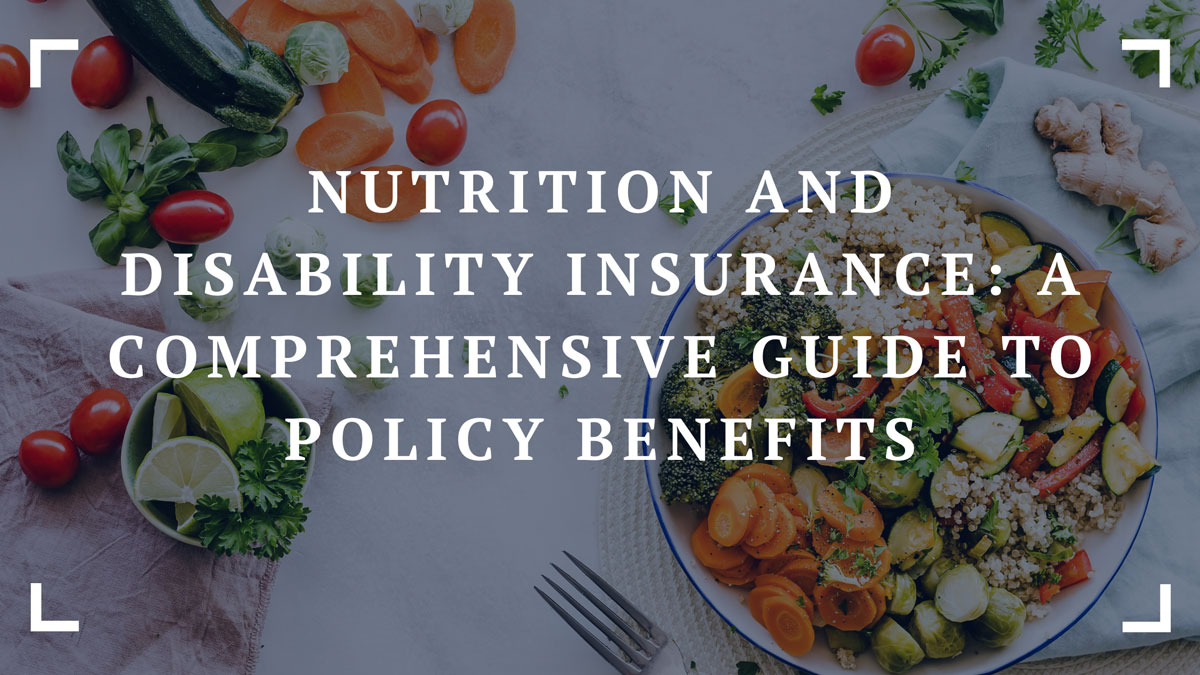Nutrition plays a pivotal role in our daily lives, influencing our health, wellbeing, and ultimately, our longevity. While the focus is often on how nutrition can help prevent diseases and manage health, what’s less discussed is how it intertwines with another critical aspect of our lives: disability insurance.
Here, we dive into how nutrition and disability insurance interlink and why it’s crucial to be well-informed about policy benefits.

1. How Nutrition Impacts Your Qualification For Disability Insurance
The most straightforward connection between nutrition and disability insurance is how our dietary choices can impact our overall health, which in turn influences insurance premiums and qualifications. Those with a balanced diet are often in better health, thereby posing less risk to insurance companies. On the other hand, poor nutritional choices can lead to health issues such as obesity, diabetes, and heart diseases.
It’s worth noting that when filing a disability claim due to such conditions, the process can become complicated. This is where the role of a long term disability lawyer becomes crucial. These professionals can help navigate the intricate web of insurance policies and ensure you get the benefits you deserve. Having an expert on your side can be a significant advantage, especially when nutrition-related conditions become a point of contention in your claim.
2. Disability Benefits: More Than Just Medical Costs
When people think of disability insurance, they often associate it with covering medical costs alone. While that’s an essential component, comprehensive policies offer benefits beyond just medical bills. This includes therapy and rehabilitation, which can involve nutritional counseling.
Having the right nutrition plan in place can speed up recovery and enhance the overall quality of life for individuals with disabilities.
3. Supplemental Benefits: Special Nutritional Needs
Some disabilities necessitate specific dietary requirements. For instance, individuals with certain metabolic disorders may need specialized diets that can be costly. In such cases, a well-rounded disability insurance policy can provide supplemental benefits that cover the costs associated with these special nutritional needs.
4. The Role Of Preventative Nutrition In Premium Rates
Insurance companies often use health assessments to determine premium rates. Individuals who follow a nutritious diet and maintain a healthy lifestyle are likely to benefit from lower premiums.
Preventative nutrition, which focuses on warding off diseases before they start, can be a valuable tool in this context. By demonstrating that you’re invested in your health through preventative nutritional practices, you might find yourself in a favorable position when negotiating your insurance premiums.
5. Nutritional Counseling And Rehabilitation Benefits
Many comprehensive disability insurance policies offer benefits that extend to rehabilitation. Nutritional counseling, often an integral part of rehabilitation, can be covered under such policies.
For instance, if someone suffers from a disability resulting from a heart condition, their rehabilitation might involve dietary changes to manage and prevent further complications. If your disability insurance includes rehabilitation benefits, it’s worth exploring if nutritional counseling is a covered service.
6. Being Proactive: Combining Health And Disability Insurance
For those especially concerned about the intersection of nutrition and disability, it might be wise to consider coupling health insurance with disability insurance. Many health insurance plans offer nutritional counseling and preventative care services.
By pairing this with a robust disability insurance plan, you can ensure that you’re covered, from preventative nutrition to long-term disability care.
Conclusion
Nutrition and disability insurance may seem worlds apart, but their interconnectedness is undeniable. As the saying goes, “You are what you eat.” Our dietary choices play a massive role in our overall health, impacting not just our wellbeing but also our interactions with the world of insurance.
By understanding how nutrition influences disability insurance and the array of benefits that come with comprehensive policies, individuals can make informed decisions that safeguard their health and financial future.


